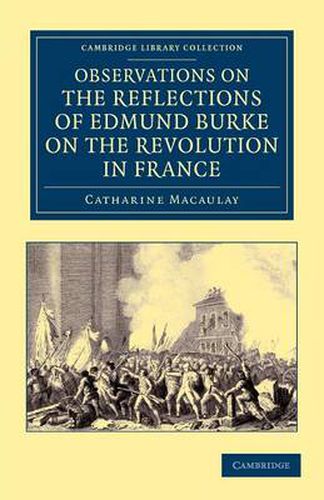Readings Newsletter
Become a Readings Member to make your shopping experience even easier.
Sign in or sign up for free!
You’re not far away from qualifying for FREE standard shipping within Australia
You’ve qualified for FREE standard shipping within Australia
The cart is loading…






Catharine Macaulay (1731-91) is considered to have been the first female historian. Her eight-volume History of England (1763-83) and her radical views brought her considerable fame in eighteenth-century England. She was a political activist in favour of parliamentary reform, and wrote several political pamphlets on the subject. She also wrote the feminist work Letters on Education (1790), which argues for the equal education of men and women and is thought to have been influential upon Mary Wollstonecraft. Macaulay supported both the American Revolution and the French Revolution and saw them as moves towards equality and liberty. This political pamphlet, first published in 1790, was written in support of the French Revolution and against Burke’s Reflections on the Revolution in France. It is a passionate polemic that challenges Burke’s interpretation of British history. It remains an important work in the history of political philosophy.
$9.00 standard shipping within Australia
FREE standard shipping within Australia for orders over $100.00
Express & International shipping calculated at checkout
Catharine Macaulay (1731-91) is considered to have been the first female historian. Her eight-volume History of England (1763-83) and her radical views brought her considerable fame in eighteenth-century England. She was a political activist in favour of parliamentary reform, and wrote several political pamphlets on the subject. She also wrote the feminist work Letters on Education (1790), which argues for the equal education of men and women and is thought to have been influential upon Mary Wollstonecraft. Macaulay supported both the American Revolution and the French Revolution and saw them as moves towards equality and liberty. This political pamphlet, first published in 1790, was written in support of the French Revolution and against Burke’s Reflections on the Revolution in France. It is a passionate polemic that challenges Burke’s interpretation of British history. It remains an important work in the history of political philosophy.